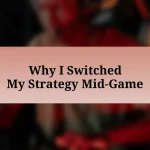Key takeaways:
- Understanding players’ mindsets is crucial for effective eSports coaching, as it can significantly enhance performance under pressure.
- Exceptional communication, adaptability, and motivational skills are essential for a successful coaching experience.
- Creating a positive and engaging atmosphere during training sessions fosters player involvement and boosts team morale.
- Reflecting on emotional and strategic dynamics within the team can lead to breakthroughs and stronger bonds among players.
Author: Evelyn Hartley
Bio: Evelyn Hartley is an award-winning author known for her compelling narratives and richly drawn characters. With a background in psychology and literature, she weaves intricate tales that explore the complexities of human relationships and the intricacies of the human psyche. Her debut novel, “Whispers in the Dark,” was celebrated by critics and readers alike, earning her a dedicated following. Evelyn’s work has been featured in various literary journals and anthologies, and she frequently speaks at writing conferences and workshops. When she’s not writing, she enjoys hiking in the mountains and volunteering at her local animal shelter. She resides in Seattle with her two rescue dogs, Luna and Milo.

Understanding eSports coaching
eSports coaching is a unique blend of strategy, psychology, and communication. I remember my first experience coaching a team: I quickly realized that understanding players’ mindsets was just as crucial as analyzing their game mechanics. Have you ever thought about how motivation can shift performance? That’s where a coach’s role becomes vital, as fostering a positive environment can significantly enhance a player’s confidence and execution during high-pressure moments.
Coaching in eSports also involves a deep knowledge of the game dynamics. I often find myself staying up late watching replays or following meta shifts just to ensure that my team remains on the cutting edge. When players struggle with a specific challenge, I encourage an open dialogue. It’s interesting—sometimes, the best strategies come from brainstorming sessions that feel more like brainstorming than strict coaching.
Building relationships is another key aspect of eSports coaching that surprised me. I once had a player who was extremely talented but battled with self-doubt. Through regular one-on-ones and sharing personal stories about overcoming my own challenges, I witnessed a tangible change in his attitude and gameplay. Isn’t it fascinating how a few heartfelt conversations can transform not only skill but also a player’s connection to the game?

Skills required for coaching
Coaching in eSports requires exceptional communication skills, which I discovered firsthand when leading my first team. Initially, I struggled to convey complex strategies in a way that resonated with each player’s unique style. Have you ever tried explaining a tactic that seemed straightforward to you, only to find it met with confusion? I learned that adjusting my communication methods—sometimes using metaphors or visual aids—could make all the difference in a player’s understanding.
Another essential skill is adaptability. In one instance, we faced a formidable opponent whose strategies evolved rapidly throughout the match. It was exhilarating yet stressful, forcing me to think on my feet. I had to modify our game plan mid-match, and that experience taught me that staying flexible and attentive is critical. Isn’t it thrilling to see how quickly a team can pivot when the coach remains calm and focused?
Lastly, a coach must be a passionate motivator. I remember a particularly tough day when morale was low after a string of losses, and I needed to uplift the team. Drawing from my own experiences of overcoming setbacks, I shared stories of comebacks—both on and off the battlefield. Watching their spirits lift in response was profoundly rewarding. How do you spark enthusiasm in others, especially when the going gets tough? It’s all about creating that shared vision of success, where every member feels empowered and believed in.

Preparing for a coaching session
The first step in preparing for a coaching session is gathering detailed information about the strategies we plan to cover. I remember one evening when I spent hours analyzing past match replays. It was a game-changer to identify not just mistakes, but also the strengths we could build upon. Have you ever felt the thrill of discovering a hidden pattern that could shift the odds in your favor? It instills a sense of excitement as I piece together what we can improve.
Next, I love to create a structured training plan that includes drills, discussions, and reviews. I recall designing a session that emphasized teamwork through a series of collaborative exercises. Seeing my players engage while sharpening their communication skills was incredibly rewarding. How do you create an environment where every player feels involved and motivated? I’ve learned that incorporating their input in the planning stage fosters ownership and commitment, ultimately elevating our performance.
Finally, I take a moment to set the right atmosphere for the session. On particularly tense days, I’ve noticed that a light-hearted approach can ease the pressure. When I introduced a fun icebreaker before we dove into the heavy tactics, I could feel the energy shift. Have you felt the difference a positive vibe can make before tackling serious challenges? Even a simple joke or a bit of banter can serve to strengthen our bond and align our focus.

Interaction with players
When it comes to interaction with players, I find that communication is the cornerstone of effective coaching. I often hold one-on-one sessions to address individual concerns or suggestions. It’s during these conversations that I’ve uncovered what truly motivates each player. One player once confided in me about feeling sidelined during group strategies. By acknowledging their feelings, we not only strengthened their confidence but also improved our team dynamics. Have you ever realized how a simple conversation can change the course of someone’s mindset?
During team practice, I prioritize open dialogue, encouraging players to voice their opinions about strategies or tactics we’re implementing. I remember a session where one of the players proposed an unconventional tactic that initially sounded risky. However, after discussing it, we decided to incorporate it into our gameplay. This not only made them feel more valued but led to a surprising victory in our next match. It’s incredible how empowering players can lead to unexpected breakthroughs.
I also believe in using humor and casual banter to create a comfortable atmosphere, especially when tensions run high. There have been moments when stress levels were palpable—like before a major tournament—so I made it a point to lighten the mood with shared inside jokes or stories from our past games. Engaging in these moments helped us reconnect with the fun of the game, reminding us that we’re not just a team, but a family. Have you felt how camaraderie can transform a group’s energy?

Reflecting on personal coaching experiences
Reflecting on my coaching experiences often leads me back to the pivotal moments that shaped my approach. One instance that stands out is when we faced a major losing streak, and it hit us hard. Instead of addressing only the tactical aspects, I decided to delve deeper into how the team felt about our performance. I remember sitting in a circle with my players, absorbing their frustrations and insecurities. It was a raw moment, and it made me realize that emotions play a significant role in performance. How often do we overlook the emotional landscape behind a player’s gameplay?
Another reflection comes to mind regarding the importance of adaptation. I had a player who consistently struggled with a specific strategy we were trying to implement. Instead of sticking to it stubbornly, I encouraged them to share their thoughts about why it wasn’t working. This discussion led to a breakthrough; we adjusted the strategy to better align with their strengths. Seeing that lightbulb moment—not just for the player but for the entire team—reinforced my belief that flexibility in coaching is crucial. Have you ever noticed how changing course can unlock potential?
Lastly, I cherish the moments when we come together not just as a team but as individuals growing collectively. I recall a time when we celebrated not just a win, but the journey to it—every late-night practice and every failed attempt. The atmosphere was electric, filled with laughter and shared stories, and it developed a bond among us that transcended competition. Reflecting on these experiences, I understand that coaching is about cultivating an environment where everyone feels they belong and can contribute. Isn’t that what every team strives to achieve?



